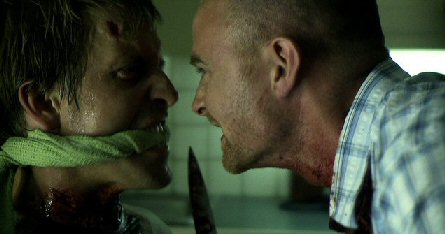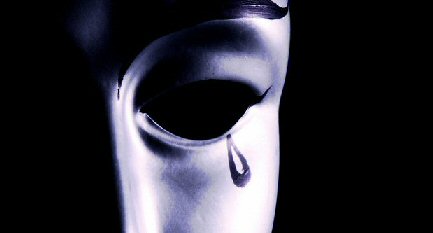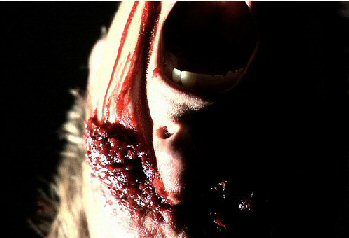With the release of Monster Pictures DVD of THE HARSH LIGHT OF DAY, our very own Stu Willis catches up with debut feature filmmaker Oliver Milburn to discuss the making of the film and the fledgling filmmakers career…

Stu: First off, I have to say congratulations on an excellent feature debut.
Oliver: Thanks!
Stu: You’re relatively young for a filmmaker. I understand you finished your one-year Masters degree in filmmaking and then launched yourself directly into making THE HARSH LIGHT OF DAY. Can you tell us how the project was kick-started?
Oliver: With a naïve confidence I think! That’s a good thing – you need it. We were in position where we could (no mortgage to pay etc etc), and with technology now being what it was, we knew if we could scrape together any sort of budget we could probably make something. I wrote four drafts in six weeks, and then we were shooting!
Stu: What exactly did Emma Biggins do then, in her role as producer?
Oliver: Most importantly she got the money in, which is the essence of producing. But that involves many things beyond asking for money. She made a really great business plan that described the film, the plot etc, and most importantly was realistic but optimistic about the finance side of things. It didn’t say ‘this is the next Blair Witch’, it just said ‘here’s what we plan to do, here’s what you could get from it.’ We basically shopped that out to local businesses etc and waited. When we were shooting she pretty much killed herself doing about 20 different roles, and the same again over a protracted period in post!
Stu: Why vampires? It’s a particularly busy marketplace at the moment, which could potentially have meant your film would get lost among the deluge of other bloodsucker films getting released. What was it that you aspired to bring to this sub-genre?
Oliver: It’s my main lament – not about the film, but about the market. When I was writing HLOD (in 2009), I hadn’t even heard of Twilight. It certainly hadn’t got massive in the UK yet. While we were shooting I think one of the crew said something about a teen vampire film everyone was going mad for. It was Let the Right One In that got me writing vampires, but in the same way as that film, I don’t think HLOD is about vampires. The concept worked with the story I wanted to tell – a character selling his soul for revenge. Beyond that, I thought I could bring some new tricks to the table (such as their full five-sense photographic memory), and I’ve always loved the idea of the classic, ancient vampire character.
Stu: I found your film to be a surprisingly mature debut, especially with regards to its meditations on loss and the conscience that comes with exacting revenge. What prompted this approach?
Oliver: Thanks, I think I just like that in films. I try to tread that line between entertainment and statement that I think is quite niche. People often want one or the other. I don’t agree with the notion that a filmmaker should make a film just for his or her self, if you do that then you’ve no right to expect a budget, but at the same time a film which just tries desperately to entertain will always feel hollow. I love genre, I think I’m a ‘genre filmmaker’ if such a thing exists, but I think anyone who really loves genre knows that the best examples mix the ‘cool stuff’ with a genuine story and an attempt to at least address something deeper.

Stu: Can you tell us a little about the casting process, particularly with regards to the roles of Daniel and Infurnari?
Oliver: Those two were a godsend. The whole cast was. Casting on this kind of budget, when you start out you set the bar at ‘they can deliver a line’ kind of level, but we got some real pros whose careers I sincerely hope HLOD boosts. Giles (Infurnari) we were aware of beforehand – he’d done some other horror movies, was great in them, and has vampire written all over his annoyingly handsome face. Dan (Daniel) was much more of a lucky draw. We did open casting for ages but found no-one suitable. In the end I had to go headhunting, rather than waiting for them to come to us. Dan hadn’t been acting long – he had a totally different career until about a year before I think. That was perfect for us. I’ve no doubt he’s got an incredible career ahead of him, but at the time he was new, very talented, and yet the right age for the role.
Stu: There are a crossing of genres in your film, incorporating horror, thriller, urban crime and socialist drama. How much of the end result was conscious in this respect?
Oliver: Making a budget movie means compromise all the way, but I can honestly say its one of the things I wanted to do from the start. I love cross genre films, films which change gear or play with expectations. Audiences are really savvy with it now – in fact I think critics are a little behind on that, because they think audiences can’t handle it. They tend to say ‘it doesn’t know what it wants to be’, but sometimes those films want to be many different things. I think I’m one of the only people who loved it when Sunshine suddenly kicked into a horror film in the final third, and thought that The Signal with its three totally different styles was one of the best films of its year.
Stu: Shooting on a low budget within the constraints of a tight schedule can’t be easy, especially when you’re new on the block. Can you explain to us some of the problems encountered and how you overcame them?
Oliver: Everything was a problem! I could fill the whole interview explaining the different things that had to change or be compromised in some way. Some of it turned out for the best of course, but most was hard to take as a director. I should stress I had a great team to help deal with it; no-one was dropping the ball. All you can really do is get on with it first of all – tantrums won’t help – and try to retain the essence of what you’re trying to achieve, which I think we did.

Stu: Are the characters based on anyone? Obviously the tale is a Faustian one, but I was wondering specifically whether Occult author Daniel was based on anyone?
Oliver: Not really. Yes, the Faustian thing was at the core. I think Daniel was a bit of a nod to Stephen King which I used to read a lot as a boy (there’s something wrong with that). His books always seem to have writer protagonists!
Stu: Which directors would you cite as major influences on THE HARSH LIGHT OF DAY?
Oliver: On me as a director, the list would be very very long, since I like all types of film. On HLOD specifically, definitely Clive Barker. I watched Hellraiser somewhere between 8 and 10 years old, and it has stayed with me since. I tried to recreate that atmosphere – not jumpy scares so much as thick, dark, sickly horror that crawls rather than leaps.
Stu: A number of British genre filmmakers have been interviewed by SGM over the last decade, and more than a couple of them have moaned about distribution being such a headache that they’ve almost thought about ditching their film careers. And yet, you appear to have had it good so far. Have you faced any of the British film industry’s infamous disdain for low budget horror films?
Oliver: Insightful question! I think – and I should stress that I think before I get irate filmmaker rhetoric – that they’re two different things. We made HLOD knowing it was commercially viable. That doesn’t mean we had £ signs in our eyes, just that we wanted to entertain people, and entertaining people means you have a product. That’s how distribution works. Distributors have to make a living too, so the bottom line is if you manage to make a film which people might want to watch (not just in the idea, but the execution), you will get distribution.
The industry’s disdain however, definitely. As a genre filmmaker, I’d be better off in the states, but I like it here. Here… well, let’s just say if we’d achieved the same thing with a kitchen sink drama, I think there’d be a lot more festivals, industry doors and mainstream critics on our side!

Stu: Have you sat in any screenings of the film? Does any occasion in particular stand out for you?
Oliver: I have – it’s difficult. As I director you’re over sensitive. You take silence, every shuffle or mutter, to mean people are hating it, as if they should be constantly leaping out of their chairs in delight. Then it finishes, you think it’s bombed, and you get applause and people saying they loved it. It’s really nice but gut-wrenching at the same time. There are a few lines and a couple of moments which always get an audible response – I don’t want to spoil anything but two of them involve the character Roy, and another involves a head. That’s always really nice.
Stu: Your short film "Speechless", included as a bonus feature on Monster’s disc, shows a lighter side to your talents. Clearly you’re someone who aims to flex his versatility. Do you hope to branch out of the horror genre? If so, which genres would you like to tackle?
Oliver: You know I’ve never met a director who wanted to do one type of film. I think it’s an industry thing – you hire someone whose done a romcom to do your romcom because you know you’ll get a romcom. So yes, I want to do other stuff, but for me it’s all about story. I love horror, if another horror film came along with a story I liked I do it in a flash. But I’m really keen on sci-fi (the genre geek in me) and comedy. Speechless was a bit of a love-letter to Swanage where it’s set, a town which I spent a lot of my youth in. Comically, though, I’d love to do something more along the Morris/Iannucci lines.
Stu: Your film now sits among the likes of KILL LIST and THE DEVIL’S BUSINESS at the fore of an exciting time for independent British horror films. What’s your take on the current scene and THE HARSH LIGHT OF DAY’s place in it?
Oliver: Well Kill List was just phenomenal, and if we are sitting along side it I’m very happy. It’s wonderful that technology has allowed people to make horror films (even more) cheaply than before. Old-schoolers will tell you that its ‘easier’ to make films now, but ‘cheaper’ and ‘easier’ are two different things. It’s no easier to make something moving or powerful or entertaining than it ever has been. I think the result of that is that we are a little swamped wit lo-fi horror. I’m not discouraging it – I’d be the last person to do that – and in general I think the horror scene is as exciting and transgressive as ever. Eden Lake, The Signal, Kill List, Killer Joe (yep). But I do think one of the results of low-budget filmmaking is that horror seems to have become an exercise in tone and scenario rather than story. Get a bunch of wafer-thin characters, and put them in a cool/scary scenario that you can afford. My hope is that HLOD tries to regain that focus on story a little bit.
Stu: Finally, I have to ask: what are your all-time favourite horror films?
Oliver: Hellraiser, The Shining, The Signal, Sunshine, Requiem For A Dream (it’s a horror film), Evil Dead 1 or 2, Paperhouse, IT and The Stand, Cabin in The Woods, The Fly, The Grudge, The Exorcist… I could go on as they occur to me. 28 Days Later is the film (horror or otherwise) that made me realise I could maybe make a film myself, so that would have to be my number one I think.
Stu: Thanks, good luck with the film.
Oliver: Thank you!
Special thanks to Oliver Milburn and Steve at Monster Pictures. Check out the official website for The Harsh Light of Day here.